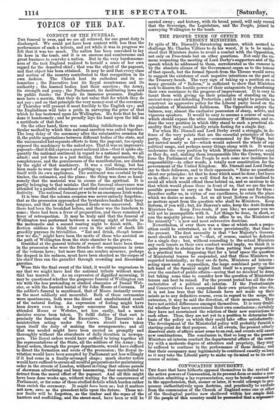THE PROPER TE'RM OF OFFICE FOR THE PRESENT MINISTERS.
IN spite of Mr. Disraeli's threatening manner, which seemed to challenge Mr. Charles Villiers to do his worst, it is to be under- stood that Ministers desire to avoid a combat with the Opposition, not only on Free-trade but on other questions. Not only the ru- mour respecting the meeting of Lord Derby's supporters and of the speech which he addressed to them, corroborated as the rumour is by the absolute silence of the Government organ as to the tenour of that speech, but the formal Speech from the Throne would serve to suggest the existence of such negative intentions on the part of the Treasury-bench. The very sign of taking up a position on so many grounds of "Reform," is sufficient to show that Ministers seek to disarm the hostile power of their antagonists by abandoning their own resistance to the progress of improvement. It is easy to taunt them with giving up their principles of standing on the ancient ways and defending Protection ; and it might be possible to construct an aggressive policy for the Liberal party based on the calculation of Ministerial feebleness. The Opposition enjoys the balance, nay, almost.the exclusive possession of sharp, active, and vigorous speakers. It would be easy to assume a course of action which should expose the utter inconsistency of Ministers, and re- duce the very position in. which fifty stand to such a practical ab- surdity that they could hardly retain footing for a single day.
For when Mr. Disraeli and Lord Derby avoid a struggle n de- fence of the very points that are the essential principles of i their party, they adopt a practice—commenced by the Whigs, but not carried nearly so far—which would subvert the whole of our political usage, and perhaps many things along with it. It would undermine the very position by which Ministers themselves exist as they do, and, making them irresponsible like the Crown would force the Parliament of the People to seek some new incidence for responsibility—in other words, a totally new constitution for the government of the -United Kingdom. Mr. Disraeli and Lord Derby say to their followers, and to their opponents, "Raise no questions about our principles : let that be done which must be done ; but leave us in office; for we are so well fitted for it, we are so inclined to avoid all which would offend those behind us, and so anxious to do that which would please those in front of us that we are the best possible persons to carry on the business for you and for them : therefore suffer us, in virtue of our excellences, o retain the place which we desire so much. Let us all treat Reform or Protection as matters apart from the question who shall be Ministers. Keep Reform' if you will ; but, for Heaven's sake, keep the Anti-Reform Ministers too. Keep Free-trade, if you like; we assure you we will not be incompatible with it. Let things be done, in short, as you the majority please ; but retain office to us, the Ministers of the minority " : a new and most subversive doctrine. Nevertheless, if ever there was a time at which such a propo- sition could be entertained, as it were provisionally, that time is the present. The first necessity is that "her Majesty's Govern- ment should be carried on "—that, of course' cannot be deferred for a single day; but, without conceding to the actual Ministers any such tenure as their own conduct would imply, we think it is quite possible to abstain for a time from putting that proposition to a practical test. Supposing that for a brief space the question of Ministerial tenure be suspended, and that these Ministers be regarded technically, as they are de facto, Ministers ad interim : acting upon such a supposition, the large combined party on the left hand of the Speaker might limit itself to a proper vigilance over the conduct of public affairs—seeing that no mischief be done, but taking some time to consider how the question of Ministerial tenure can best be raised. For the present period has all the cha- racteristics of a political ad - interim. If the Protectionists and Conservatives have suspended their own principles sine die, it is not less true that the Liberals have not made up their minds as to any definitive course, even in regard to the scope, the extension, it may be said the direction, of their measures. They have not settled differences amongst themselves. It is very dnubt- ful whether they have ascertained their own conclusions ; certainly they have not ascertained the relation of their new convictions to each other. Thus, they are not yet in a position to determine the basis of the policy on which they could take office satisfactorily. The development of the Ministerial policy will probably furnish a starting-pomt for that purpose. At all events, the present utterly dissolved state of affairs must come to an end, and events will cause new combinations. The conclusion is that so long as the present Ministers ad-interim conduct the departmental affairs of the coun- try with a moderate degree of attention and propriety, they may be suffered to continue in the performance of these duties; and that their occupancy may legitimately be continued exactly so long as it may take the Liberal party to make up its mind as to its own course of action.


























 Previous page
Previous page